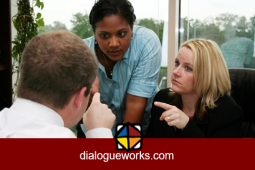Do You Empower Your People? 10 Strategies for Empowering Others
.png)
When I was in my first job in corporate America, I had a one-of-a-kind manager. The first thing he did when meeting with me was to ask me what I wanted to become and what my vision of my future career looked like. I really hadn’t given it much thought, and so I candidly told him so. Always abounding in patience, he began by asking me a series of well-thought out questions that made me think.
Why Do People Become Defensive? Six Factors That Influence Defensiveness

Recently I held a number of open office hours online to answer questions that people had about emotional intelligence. By far the most frequently asked question was, “Why do people become so defensive?” Perhaps the easiest way to understand defensiveness is to understand what makes each of us defensive.
Will You Pay It Forward? Seven Tips for Making a Difference

This past week I was shocked to read about two passengers on a flight who evidently started a fight over their different political views. The pilot went on a rant over the plane’s intercom taking the fighting passengers to task to defuse the situation. With all the divisiveness that seems to be going on right now, each of us ought to put a particular emphasis during the upcoming holiday to go out of our way to make life more rewarding for one another.
Managing Emotions in the Workplace

I recently had a team ask me if emotional displays were appropriate in the workplace. When I asked them what they meant, they shared with me that one member of their team would sometimes cry when discussing topics that were relevant to his or her work.
I took the time to explore the situation with the person. I concluded that his or her behavior resulted because some team members didn’t see the issue in the same way or feel as passionately as they did about the situation that was being discussed.
When we consider the appropriateness of emotional displays, the expression of emotion could be placed along a continuum from aggressive or “hot” to passive or “cold.” Obviously when someone begins to shout, demean, or use derogatory terms, the person who is confronted by such behavior will usually respond in two ways: they will respond in kind and meet “hot” emotion with “hot” emotion, or they will completely shut down.
Are You Answering the Call? 13 Questions to Improve the Quality of Your Leadership

One day this week when I was working at home the upstairs phone began to ring. Since I was busy, I ignored the call, figuring the answering machine would pick it up. During the next hour, the phone rang at least three more times.
Are You Mentally Tough? 8 Tips to Improve Your Success

A number of years ago, one of my sons tried out for the junior high basketball team. Unfortunately, he did not make the team. He returned home being even more deflated because he was offered a position as the team manager, a position he turned down. Rather than sulk and engage in self-pity, he went to work. He devised a plan to improve his skills, so that he could make the team as a sophomore.
Can You Talk About What Matters Most? Four Skills for Creating REAL Conversations

When I ask folks why they refuse to talk about what matters most, the most frequently offered response is, “I don’t know how to do it.” Whatever your response may be, the consequences are always the same, poor results. Such thinking usually results in what I call counterfeit conversation or “fake talk.”
How to Assess the Quality of your Relationships

Sometimes I just can’t pass up a good story. Here is one that my financial planner told me this week. It seems that he was out to lunch with one of his clients. While eating, his client was approached by a police officer who asked him to identify himself. The client gave his name, and then the officer passed him a set of papers. The client chuckled and said, “This is obviously a joke given that it is my 50th birthday tomorrow?” The officer replied, “No sir, I am an officer of the law,
How Can You Increase Your Emotional Intelligence?

Everyone has had to deal with a difficult challenge, the poor performance of others, or something that didn’t go as planned. When such a situation occurs, we may begin to experience an emotional reaction.
Are You A Fake Talker? (Part 1) Seven Tactics That Don’t Get Results

As I have traveled around the country speaking, I have frequently been asked, “Can you give us some examples of ‘fake talk’? We’re not sure exactly what that means.” You’ll remember that fake talk is any conversation that doesn’t achieve the results that you want.
What Kind of a Listener Are You? (Part 1)

Having traveled and spoken a lot this year, it is always interesting to see what learning lessons will emerge from the people that I address. I recently conducted a session with a large group with one person who seemed to be more interested in challenging me than in listening and learning about something that she hadn’t heard before. She seemed bent on contesting a lot of what I was saying with a constant barrage of, “Yeah, buts.”
9 Strategies to Becoming a Fantastic Listener

Not long ago I was reflecting on a conversation that I had with my spouse. I thought that I had not been a very good listener in a conversation that we had about an hour earlier. Knowing that she was in the next room, I called out to her, “Stephanie, I was thinking about that conversation we just had, and I was thinking I need to apologize for not listening or giving you my full attention when you were talking. Will you forgive me?” She responded, “For which time?”
Are You Afraid of Conflict? Nine Steps to Resolving Conflict

Any conversation that has the potential for conflict is a conversation that people generally avoid. Conflict can occur any time there is a disagreement over a course of action.
Navigating Sensitive Conversations on Difficult Topics

In the last several weeks, several leaders have reached out and asked me how to hold conversations about racial relations that will deepen understanding without creating offense.
Are You Taking Advantage of Teamwork during the Pandemic?

At a recent speaking event, I had someone ask me whether or not it was really worth trying to improve the quality of the way people work together.
.png)















